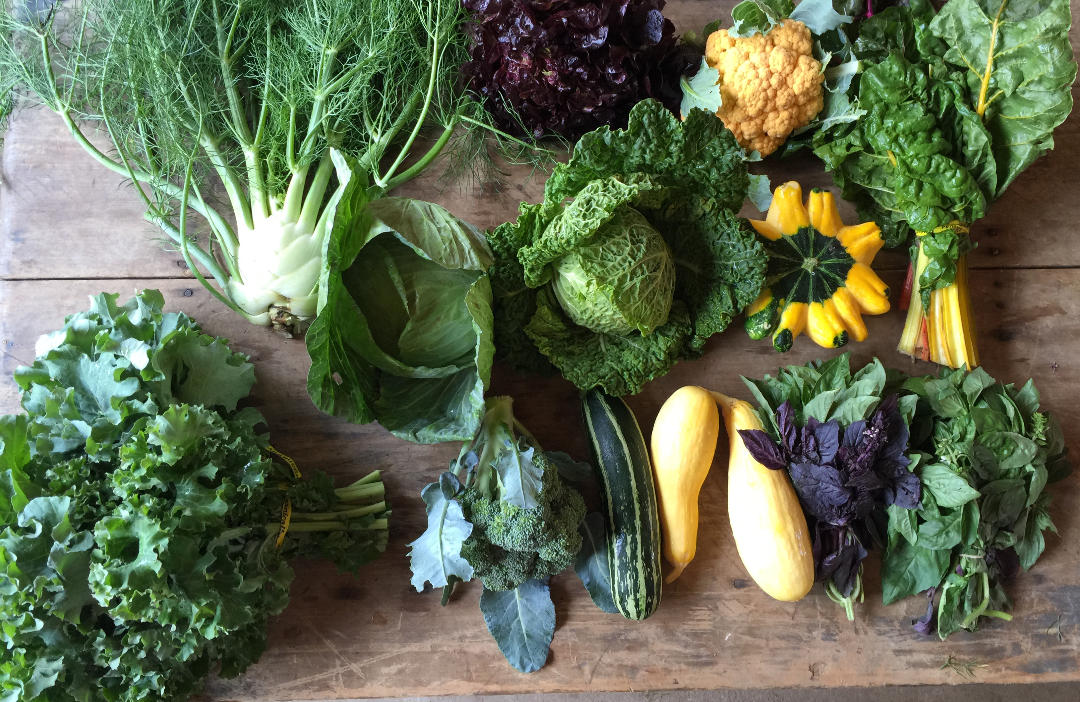CSA Shares Program
Delivery Options Available! Farmers Market Produce to Your Door
Our Highest Quality Farm Fresh Food
Our Program :
We offer many farm share options, including customized options. We also offer our unique DIVERSIFIED DIET CERTIFIED ORGANIC YEAR-LONG SHARE. THIS INCLUDES YOUR FAMILY’S WEEKLY SUPPLY OF VEGETABLES, EGGS, BEEF, and CHICKEN, YEAR-ROUND ALL FROM OUR FARM TO YOUR HOME.
*Nutrient dense organic high quality food to feed your family for $11 per day per adult.
*In-season fresh cut herbs and cut flower bouquets
*Pick up at our farm or choose locations around the Capital Region: Albany, and Schenectady County, New York
Customize an Organic CSA for yourself or your family
*Mix and match weekly or biweekly eggs, cut flowers, chicken and beef
Organic Farm Fresh Food
PLAN YOUR MEALS
CSA Shares Program:
Farm pickup or Delivery
Annual All-Inclusive CSA
$11/day per person
Year long weekly deliveries of your week’s supply of produce, eggs, chicken and beef.
EMCF Sampler Package
$160/week
Would you like to try out our products? Or simply order by the week? Check out this option! Your week’s supply of veggies, 1 dozen eggs, 1 whole chicken and 2 cuts of beef. Perfect for 2 people
Fall CSA Share
$55/week
Winter Season or Year Long Veggies
$49/week
Eat healthy all year!
Carnivore's Share
$88/week
Your week’s supply of organic beef and chicken and eggs.
Summer Vegetarian's Delight
$70/week
Summer Vegetable CSA
$55/week
Your week’s supply of farm fresh produce.
Fill out the form below to get started with our CSA!
Frequently Asked Questions
In general, the regular size CSA will supply enough produce to have one vegetable for each night of the week for two adults. “Young” families of four (two adults and two children younger than five years old) will also be a good fit for this size CSA program. Families with a greater number of children, children older than five, or vegetarians would be happier with the large share.
We are very flexible. As long as you let us know by the morning of the day prior to your delivery, we can make alternate arrangements. Some people will elect to have a double share delivered when they return from their trip. Others can tack that delivery on to the end of their share season. Others will opt to “donate” their share to a friend or a needy family.
The term organic became a regulated word in the early 1990’s by the United States Department of Agriculture (USDA) so that there would be a clear definition and specific requirements for organic farms and producers. In this way, consumers would be guaranteed to be receiving true organic food when they are purchasing something labeled as organic. We on Eight Mile Creek Farm feel it is very important for farms who call themselves organic go through the certification process; not only because it is law, but because we, as smaller family farmers need to support and help strengthen the organic standards so that they are less likely to be compromised by larger, corporate entities.
There is a detailed document that is well over 650 pages long that encompasses the requirements of being labeled as USDA Certified Organic. In a nutshell these are the main points: soil health is the basis for all organic farming; labeling of all products must be approved, all seeds must be certified organic and/or untreated; all plants and animals grow from the health of the soil, not through the use of chemical fertilizers or hormones; pest control is managed through building soil health, crop rotation, row covers, plant variety selection, starting plants in a greenhouse prior to planting outside; livestock are fed only certified organic feed, cannot be given antibiotics, hormones or GMO feeds; must have the required number of acres per animal species and proper square footage per animal in the barn; and must be processed at a certified organic facility.
Certified organic farms must recertify every year. This requires a large amount of paperwork as well as certification fees. Organic grains and seeds are 30-50% higher in cost than conventional. Livestock and produce grow slower, therefore feed costs are higher for the farmer and time to reach harvest state takes longer. Labor costs are higher due to more time spent on weeding, raising products to harvest stage, prevention of loss (need for application of row covers, use of cover crops, etc.) There is more space needed for livestock, so there are higher costs for land (per acre costs, taxes, etc.), barn space, etc. therefore there is a smaller economy of scale. Although certified organic food may seem to cost more to purchase, you are getting more bang for your buck. Certified organic food has been analyzed to be 25-50% more nutrient dense than conventional food, as well as contain significantly higher amounts of numerous vitamins, minerals, antioxidants and omega-3 fatty acids than conventional foods. In addition, the benefits of certified organic to the health of the environment are immeasurable!


These terms do not mean the same thing as being certified organic. Although a producer who is certified organic can also become certified as grass fed, the use of grass fed or natural do NOT mean the farm is certified organic. GMO feeds or seeds, growth hormones, chemical fertilizers, etc. may be in use.